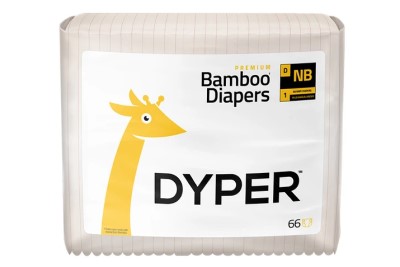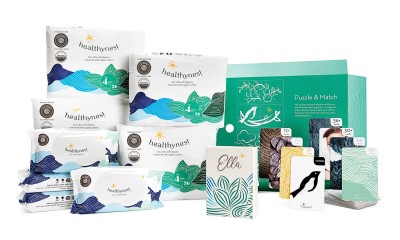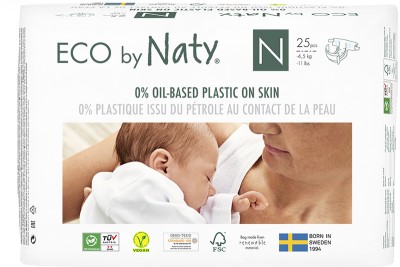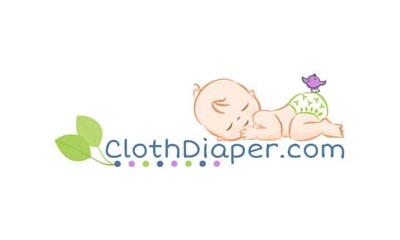TheRoundup is reader supported. We may earn a small commission when you make a purchase via links on this site, at no cost to you.
All products are personally reviewed and tested in accordance with our Review Methodology.

When it comes to finding the best eco-friendly diapers, you want the very best for your baby…but does the planet need to pay the price?
No, it doesn’t. It’s now possible for your baby to have it all. Comfort, convenience, and green eco-credentials
It’s been over a decade since Mrs. M and I have had to buy diapers, so my knowledge was a tad out-of-date at the start of the research for this article.
Our 12-month-old nephew, on the other hand, is very well acquainted with eco diapers. So on this report, I asked his mom to lend a hand.
Choosing between disposable or reusable is a tough call (read to the end of the article for my final thoughts on which option is best), so we picked our favorites for both options.
Based on your individual circumstances and ethics, you can then decide which style suits your needs best.

✔ Naturally Hypoallergenic
✔ Eco-Friendly Bamboo Pulp
✔ FSC Certified

They Say: Our eco-friendly and hypoallergenic diapers are designed with your little one’s sensitive skin top of mind. Made with the miracle material of renewable bamboo, they’re luxuriously soft while absorbing, naturally.
We Say: Sister-In-Law and I slightly disagreed on the best diapers worthy of the overall winner crown. So there was only one thing for it. Joint winners!
Designed with sensitive skin in mind, EcoPeaCo Bamboo Diapers are luxuriously soft and naturally absorbent.
But that's not all. EcoPeaCo's commitment to you, your baby, and the planet runs deep with the following:
A full range of sizes is available (from newborn to size 6), and a subscription option will save you a few bucks and ensure you never run out.
Sister-In-Law Says: These diapers are James's top pick (I prefer DYPER). However, although I disagree with his choice, I can see why he likes them.
Setting aside eco and sustainability aspects (which James has already addressed), I appreciate the inclusion of a wetness indicator and blowout guard.
I've also got a lot of time for these diapers' neat and thoughtful design.
The 'snug fit technology' is particularly brilliant. It ensures a tight but comfortable fit (wherever the daily crawling or toddling adventures take your bundle of joy).

✔ Fully Compostable
✔ Free from Harmful Chemicals
✔ OEKO TEX Standard 100 Certified

They Say: BETTER FOR YOUR BABY: Experience natural plant-based disposable diapers designed for sensitive newborn, preemie, and toddler skin. Outer and inner layers made with 100% Bamboo Viscose for improved comfort, superior wicking, and maximum fluid retention. STRETCHY, SOFT, COMFORTABLE: Ultra soft to the touch, absorbent, and thoughtfully made with honest, clean & pure ingredients. They feel more like yoga-pants than conventional diapers with an almost underwear like fit.
We Say: DYPER makes a range of eco-friendly diapers that tread as gently on the planet as any disposable product can.
Through their REDYPER program, they will, for an additional fee, collect your used diapers and ensure they’re fully composted in their own facility.
DYPER buys carbon offsets for every order to ensure that every purchase positively impacts the planet.
The diapers they produce are not just eco-friendly. They’re also incredibly soft and comfortable.
Did you know that DYPER also makes wipes? Find out more about Dyper wipes in my biodegradable wipes article.
Sister-In-Law Says: DYPER has been my company of choice from the start of my parenting journey.
They have a wide range of sizes available, and I love the convenience of the subscription. It’s pretty spooky how new diapers appear on the porch just as I’m running out. Maybe my phone IS listening to me!
The diapers are very soft to the touch, and I love the peace of mind that no chemical nasties are touching my little one’s skin.
Like many eco-friendly-minded parents, I had to initially wrestle with the thought of buying disposable diapers over reusable ones.
The fact that DYPER will pick up dirty diapers from my doorstep and compost them for me was the deciding factor in choosing this brand as my favorite.

✔ EWG Verified
✔ Organic Cotton
✔ B Corp Certified

They Say: Baby will be in diapers 24/7 for the first three years of life, and their skin is more permeable than that of an adult’s. That’s why we developed the first ever EWG Verified diaper: non-toxic, dreamy soft, and it really works. High quality, plant-based materials cradle baby’s skin, and we’ve woven in super soft, premium organic cotton to keep baby comfy and cozy, without ever sacrificing performance.
We Say: Healthbaby diapers have an impressive range of green certifications to ease the mind of even the most nervous new parent.
I’m especially impressed that they’re the first sustainable diaper brand approved by the Environmental Working Group (EWG).
They certainly give DYPER a run for their moment in the eco-friendly stakes. In fact, the only thing that lets them down compared to DYPER is the lack of a ‘collect and compost’ service.
Healthybaby offers a convenient subscription service, or you can make one-off purchases when needed.
You can even add eco-friendly dry or wet wipes to the subscription. One less thing to think about.
Each Healthybaby diaper delivery comes with a selection of enrichment activity cards.
You also get access to exclusive videos (tailored to your baby’s age based on diaper size) to support physical and mental development. NEAT!.
Sister-In-Law Says: I’m totally on the same page as James here.
I did TONS of research during my pregnancy, reading reviews and feedback from other parents, and Healthybaby diapers were always right at the top of my list.
I was all set to go with them.
Then, in my third trimester, a midwife girlfriend of mine told me about DYPER and how they collected and composted dirty diapers…and I was sold.
But, if I could not get hold of DYPER, I would not hesitate to use Healthynest.

✔ Soft and Absorbent
✔ 100% Plant-Based Ingredients
✔ OEKO TEX Standard 100 Certified

They Say: Naty nappies have 0% oil based plastic on your baby’s skin, and no nasty chemicals, and still it stays as dry as you would expect from a premium nappy. The core of our nappy is mostly made from FSC certified wood pulp, which is not only totally natural, but really good at sucking up liquid. The other layers are made of plant based materials making the nappy breathable and comfortable on skin.
We Say: Naty was born in Sweden in 1996 and has been on a mission to help the environment ever since.
Mrs. M swears by their feminine care products, so testing their eco-friendly diapers was a no-brainer.
To say I’ve been blown away by their commitment to sustainability would be a massive understatement.
Each biodegradable diaper is made from 100% plant-based and bio-based materials.
They’re also FSC-Certified and contain no oil-based plastic, chemicals, or toxins.
I was delighted to see these diapers available from EarthHero. It means you can rest assured that they’ll be delivered to you on time and in sustainable packaging.
Sister-In-Law Says: I’d been aware of ECO by Naty from my research but had never used or tested them for myself.
That was until James gave me some to use when we stayed over for Thanksgiving.
I’ll leave the environmental pros and cons to James (he loves it!).
But, from a simple “is this diaper soft and absorbent” and “does it leave a rash on baby's sensitive skin” point of view, Naty does a fantastic job.
No leaks. No diaper rash. No chafing. Definitely an eco-friendly diaper brand I would use again if I’d run out of DYPER.

✔ FSC Certified
✔ Climate Pledge Friendly
✔ Affordable

They Say: Our absorbent core provides the long-lasting, 12-hour protection your little one needs, and moms and dads appreciate, while our FreshAIRTM Breathable Layer helps release humidity. Our Sensitive Protection baby diapers are made without fragrances, lotions, or chlorine bleaching, and use only FSC Certified, sustainably sourced wood pulp that’s gentle on our planet’s forests. Wrapped in Seventh Generation’s softest, best diapers yet—the future looks good on your baby.
We Say: Seventh Generation is an honest company doing a lot of good across multiple product ranges.
Their diapers are no exception. They’re a good balance between eco-friendly ideals and affordability.
Sister-In-Law Says: I use many Seventh Generation products around the home. It’s a trusted brand I go back to again and again.
I would not use these diapers all the time, but they’re always available to pick up from most stores if I’m ever caught short on my travels.
The standout for me is the breathable layer that pulls moisture away from the skin and keeps your baby protected for up to 12 hours.

✔ GOTS Certified Organic Cotton
✔ Increased Absorbency
✔ Reusable - One-Time Payment

They Say: Our commitment to service means we will ship your order to you promptly. Orders placed on a weekday will either ship that afternoon or the next business day. Orders placed on the weekend will generally ship on Monday. UPS Next Day and Second Day Air shipping will ship the same day if received week days before 2PM EST/12 PM MST.
We Say: I prefer eco-friendly disposable diapers over cloth diapers (see The Final Word at the end of this article).
However, I also see the attraction of reusable cloth diapers (sister-in-law has a neat solution that combines both disposable and reusable that I’ll let her elaborate on below).
Sister-In-Law Says: When our little one was first born, he was diapered exclusively with compostable disposable diapers from DYPER.
Now, he’s walking around; the routine has changed slightly.
Whenever possible, I try to use reusable organic cloth diaper options during the day.
We then switch to disposables at bedtime (to take advantage of the increased absorbancy capacity and prevent diaper rash).
The world of cloth diapers can be a bit daunting at first. There are LOTS of options.
I eventually went for the OsoCozy-Thirsties Organic Flat Economy Packages with Thirsties Duo Covers and have never regretted my decision.
The package included everything I needed to start my reusable diaper journey. I even got to choose between loads of cute patterns.
ClothDiaper.com is great. There are loads of brands and cloth diaper options (prefolds, fitted, flats, all-in-ones, pockets, etc.) and their online chat support is knowledgeable and helpful.

Now you know what the best environmentally friendly diapers are - it's time to look at the "why".
If you're wondering why should you ditch traditional diapers and pay more for sustainable alternatives, these statistics might just convince you.
The latest 2025 data shows why conventional disposable diapers are such a problem for the environment.
It’s stats like these that highlight the urgent need for more eco-friendly diapers.
Sources: Science Direct | EPA | LoveToKnow | Dufferin Research | NDBN | EnviroPerks
Most eco-friendly diapers aren't perfect and nobody is pretending otherwise. But as a parent, you need to use something, and sustainable diapers may be the least-worst option for a number of reasons.
By switching to eco-friendly diaper brands you can help yourself and the planet in the following ways:
Disposable diapers that break down into smaller elements under specific conditions (usually in a commercial facility) are referred to as biodegradable diapers.
They don’t completely break down, and some material traces will remain.
Compostable diapers are similar to biodegradable diapers, but they entirely break down into natural/organic material.
Sustainable is a bit of a catch-all term that refers to diapers that contain fewer ‘nasties’ than some other diapers.
They’re usually made from some plant-based materials or offset their carbon footprint.
Generic terms like organic, chemical-free, natural, etc., are often thrown around, so caution is needed to avoid being greenwashed.
Cloth diapers have come a long way from the terry toweling ones I wore, and my mom used to boil clean in a big pot on the stove.
Usually made from sustainable fabric, cloth diapers are generally one of the following:
When washing reusable diapers, avoid any off-the-shelf pods or liquid detergents - they may contain chemicals that could harm your baby's skin.
Products labeled as natural diapers may be made wholly or partly using sustainable or plant-based materials.
The term "natural" is fairly non-specific and a lack of US regulation regarding its use in the diaper industry means you need to look closer at the product yourself to decide whether it is truly eco-friendly.
The takeaway is not to assume that a product is made from biodegradable materials just because it is labeled "natural". It may be, or it may not!
Yes, bamboo diapers are considered better for the environment than traditional disposable diapers made from synthetic materials. Bamboo is a renewable and biodegradable resource that grows quickly and requires fewer pesticides, fertilizers, and water than other crops.
Providing they don't have any synthetic materials added, bamboo diapers are also compostable.
However, it is important to note that not all bamboo diapers are created equal. Some brands may use unsustainable or harmful materials during manufacturing processes, so it is essential to research and choose reputable brands.
Depending on the environment they are left in, bamboo diapers can decompose in as little as 70 - 90 days.
Pampers Pure is the most eco-friendly option in the Pampers range. They use plant-based materials and are free from harmful chemicals. They didn’t quite make it onto my list of recommendations because I felt Seventh Generation eco-friendly diapers just edged it.
Huggies Special Delivery diapers are their range of eco-friendly baby diapers. While some effort has been made to make this disposable diaper eco-friendly, I feel more could be done.
This depends on the unique makeup of your baby’s skin. Some babies get diaper rash very easily and others hardly ever. The general rule of thumb is to look for eco-friendly materials and zero chemicals. All the recommendations in this article meet that brief.
Initially, you’d probably assume that a reusable cloth diaper is a clear winner over a disposable diaper when it comes to eco-friendly diapers.
However, when you dive down into the topic, you quickly discover it’s not that simple.
When you consider the environmental impact of growing cotton and the amount of energy, water, and laundry detergent it takes to wash 7,000 diapers, eco-friendly disposable diapers start to become more appealing.
Cloth isn't the only eco-friendly way to diaper your baby.
I believe that a good quality biodegradable disposable diaper from a reputable company with solid eco-credentials and a sustainable supply chain is the best option when it comes to diapering your baby.
Where do you buy your eco-friendly diapers? Have I missed your favorite brand? Do you disagree with me when I say that the most environmentally friendly diapers are disposable ones? Drop me a line and let me know.

Our core values mean we always prioritize sustainability over profit. We carefully evaluate and personally test every product to ensure they meet our high standards. All products recommended in this article were tested in accordance with our Review Methodology.
TheRoundup.org - As Seen On
